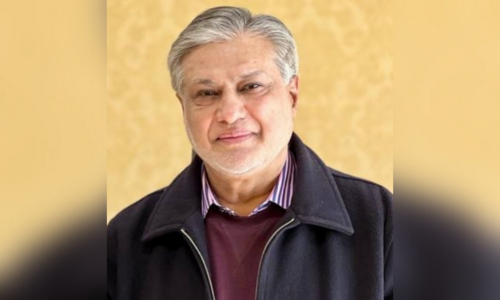
ISLAMABAD: Senate Chairman Sadiq Sanjrani has declined a request by self-exiled Pakistan Muslim League-Nawaz (PML-N) leader Ishaq Dar to be administered oath as a senator either virtually or through the Pakistan High Commission in London, declaring that the Constitution and the rules do not allow him to do so.
Mr Dar was informed about this decision through a letter which was released to the media by the Senate Secretariat.
Mentioning and reproducing Articles 55 and 65 of the Constitution and Rules 6 and 7 of the Rules of Procedure and Conduct of Business in the Senate, 2012, the Senate chairman has conveyed to Mr Dar that he will have to ensure his physical presence in the house to take the oath.
Mr Dar, who has been residing in London for over four years, had written a letter to Mr Sanjrani on Feb 2, asking him to allow him to take oath as senator either virtually or through the Pakistan high commissioner in the UK or any designated person, stating that he could not travel to Pakistan due to his health condition.
Senate chairman informs PML-N leader he will have to appear in person
Mr Dar had also sent a copy of the letter to the Election Commission of Pakistan (ECP) in which he had attached a medical report from a British neurosurgeon advising him not to travel to Pakistan.
“Due to my prolonged illness and ongoing medical treatment within the UK, I am unable to return to Pakistan immediately to take the requisite oath in person; my latest medical report dated January 21, 2022 of Dr Gordan Grahovac, Consultant Neurosurgeon, Harley Street, London, is annexed herewith. It is, therefore, requested that arrangements may please be made to enable me to take the required oath, virtually, through any electronic mode as you may deem convenient; the same being within the applicable legal framework and being used by the apex courts of Pakistan,” Mr Dar had written in his letter.
He had drawn the attention of the Senate chairman towards a constitutional mechanism for administration of the oath as provided in Article 255 of the Constitution, in case the oath could not be administered virtually to a reason.
Article 255(2) states: “Where under the Constitution, an oath is required to be made before a specified person and, for any reason, it is impracticable for the oath to be made before that person, it may be made before such other person as may be nominated by that person.”
Mr Dar was elected senator on a technocrat seat from Punjab in March 2018. He had left for the UK before the Senate elections after the National Accountability Bureau (NAB) began investigations against him in a reference for keeping assets beyond his known sources of income.
Mr Dar’s nomination to the Senate had been challenged by one of his rival candidates, but it was dismissed by a division bench of the Lahore High Court. The LHC judgement was then challenged in the Supreme Court which suspended the ECP’s notification of Mr Dar’s election as senator in May 2018.
Mr Dar had informed the Senate chairman that earlier he could not take the oath as a senator due to the suspension order of the court and the ECP.
In December last year, he said, the Supreme Court had dismissed the petition challenging his election and as a result the ECP had on January 10 withdrawn its suspension notification and declared him as returned candidate to the Senate.
“Accordingly, I am writing this letter to convey my readiness and willingness to take the requisite oath as member of the Senate of Pakistan, at the earliest,” Mr Dar had written.
However, the Senate chairman has informed Mr Dar that under Article 65 of the Constitution and Rules 6 and 7 of the Rules of Procedure and Conduct of Business in the Senate, 2012, a member-elect has to take oath before the Senate itself and cannot do so virtually or before any individual like the high commissioner. He said that even the roll of member had to be signed by every member after making the oath before the Senate.
“Indeed Senate being part of parliament and an elected house governed by its own rules and procedures cannot be substituted by an individual like the high commissioner. Article 255 is not applicable to the taking of an oath before the Senate,” wrote Mr Sanjrani.
Rule 6 titled ‘Oath of members’ states that “a person elected as member shall, before taking seat in the Senate, make before the Senate oath in the form set out in the Third Schedule to the Constitution”.
Published in Dawn, February 23rd, 2022













































